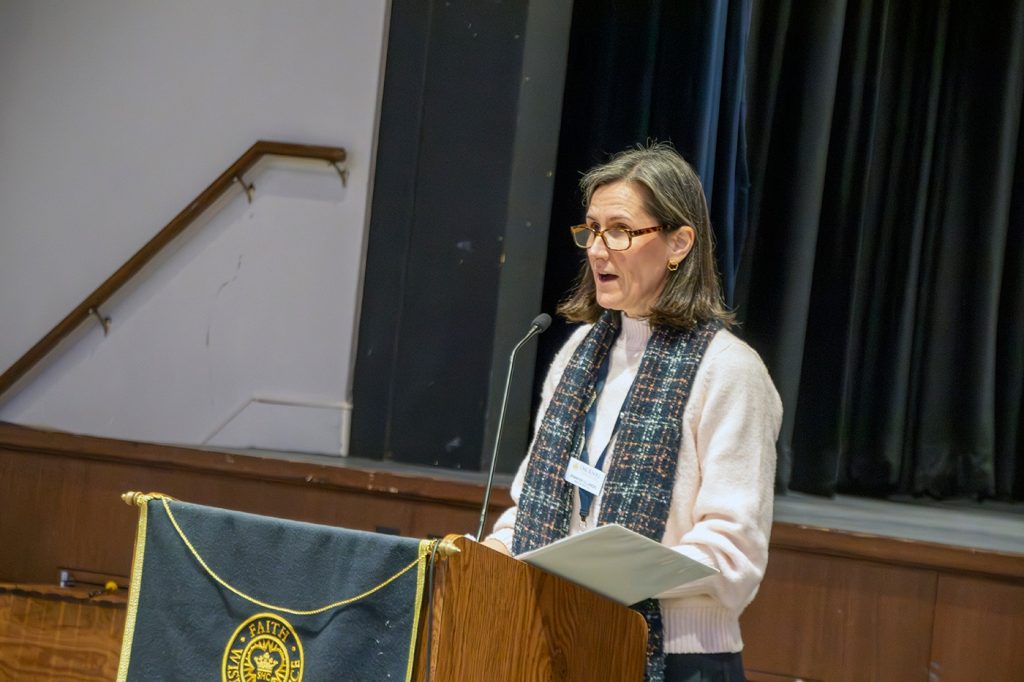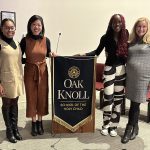Head of School Jennifer G. Landis’s Powerful Words at MLK Day Assembly
 About 25 years ago, I attended a two-day workshop with a colleague of mine. We were team-teaching a peer leadership course to 12th-grade students, requiring us to undergo a training program. We learned about all kinds of things regarding group dynamics and group facilitation. I don’t remember the specifics of the workshop, with one significant exception, which, for some reason, I remember very vividly.
About 25 years ago, I attended a two-day workshop with a colleague of mine. We were team-teaching a peer leadership course to 12th-grade students, requiring us to undergo a training program. We learned about all kinds of things regarding group dynamics and group facilitation. I don’t remember the specifics of the workshop, with one significant exception, which, for some reason, I remember very vividly.
We were asked to participate in an activity with three other pairs of facilitators, making us a group of eight. We were each given an envelope, and triangles of varying sizes were in the envelope. We were told that we needed to rearrange all the triangles into squares and that the activity was only complete when each person had a square in front of them and each of our squares were the same size. In other words, those triangles would fit together to make larger squares, and there were just enough shapes to ensure that we all had one large square equal to everyone else’s. Easy enough. Then came the rules —we couldn’t talk, and we couldn’t take pieces from each other. We could only give our pieces away to others. Fine.
We all started working on this, sliding pieces into one another and making squares. When we saw that we had a piece that might help make someone else’s square complete, we would push that piece across the table. After a little while, I had a square in front of me that appeared to be the right size. I scanned the rest of the group and saw seven of us had squares. Then I realized one person didn’t — my partner. I looked at her and made a questioning face, and she looked back at me and shrugged. I didn’t know what to do because I was all set. I had a square. It then occurred to me that the way the other seven squares were configured prevented her from having a square. So, somewhat reluctantly, I pushed my pieces to others. They pushed them back. I pushed my pieces away again. They pushed them back. This went on a few times. They also avoided eye contact with me and with my colleague. It was very uncomfortable, but I kept pushing the pieces of my square, getting increasingly frustrated and unsure of how else to help my friend. Then, the a-ha moment finally came to a few others, and they started pushing their pieces around, too. Eventually, all the pieces got rearranged. We solved the puzzle, and everyone got a square.
The game was supposed to be about nonverbal communication. I think it was about justice. It was about the group looking out for each other. It was about the group recognizing that if everyone didn’t have what they needed, we weren’t done. I was struck by how the other pairs avoided eye contact with me and my friend. It was just a silly game, but they didn’t want to give up what they had to ensure we had what we needed. One element of this experience that I think about often is what I would have done if it hadn’t been my partner who needed help. What if it was someone else at the table, a stranger who I didn’t know? Would I, too, have avoided eye contact? Would I have been too desperate to keep my precious square that I couldn’t see a path to make sure that we all had one? Would I have been able to look beyond how it seemed in front of me to how it really was? I hope so.
Today we honor the legacy of Dr. Martin Luther King Jr. We’ve heard a lot about his dream, and we have heard words of the great poet, Langston Hughes, and how he talks about dreams in beautiful, complex, and sometimes melancholy ways. We have seen images of people who showed up to demonstrate, people who stood in solidarity, people who cried out in anguish. We have heard about Dr. King’s dream, and we have heard his own granddaughter ask for a renewed commitment in asking for that dream to be fulfilled. As we think about this, we all must consider our role in that fulfillment.
Are you, like my friend, lacking power in the moment to make the change that is needed? Relying on someone to notice and use their power to help?
Are you, like me with the game, a little reluctant to give up what you had but willing to do so for a friend?
Are you like the other people at the table, turning away to avoid the reality in front of you?
Are you like Edith, the little girl from the photograph, watching with awe, admiration, and perhaps a little fear as others stand up on your behalf?
Are you one of the people in the crowd at the March on Washington, crying out for justice?
Are you one of the people at the March, standing shoulder to shoulder with others, holding hands in solidarity?
Or are you home watching it all on TV, perhaps too easily able to change the channel?
Last Monday, I attended a service in honor of Dr. Martin Luther King Jr. at my church. The speaker was excellent, and she shared stories about her mother, a journalist for the Chicago Defender newspaper during the height of the civil rights movement in the 60s. She talked about what it was like to grow up Black in Chicago during this time and what they witnessed happening on TV and in the streets. She spoke of her mother going to the March on Washington and the March on Montgomery and covering all sorts of demonstrations and events in the name of civil rights. The speaker was a Black Catholic woman. She spoke beautifully about the Catholic Church’s position on justice. A position that is unequivocal. A position that is reflective of the example of Christ. A position that is, as she noted, referenced more than 300 times in the Bible, ranking second only to love. We are called to seek justice…and not just for ourselves but for one another…in fact, it is especially for others that we are called to act with justice.
As I reflect on this, the following is not lost on me. If I can see injustice in a game made of paper triangles, I had better be able to recognize it in real life in my fellow human beings. We all need to. It exists in our own community, our dining hall at lunch, our friend groups, our professional communities, our town, our nation, and our world. It is why we are still talking about King’s dream 60 years later. Recognizing injustice is the first small step to MLK’s dream fulfillment, and we must all do our part. I encourage you to consider the shapes in front of you and make sure you are willing to give of yourself, especially if you already have a square. Be willing to be a little uncomfortable or a lot uncomfortable in the name of justice. We are compelled to as members of this community, as members of the human family, as people of faith.






